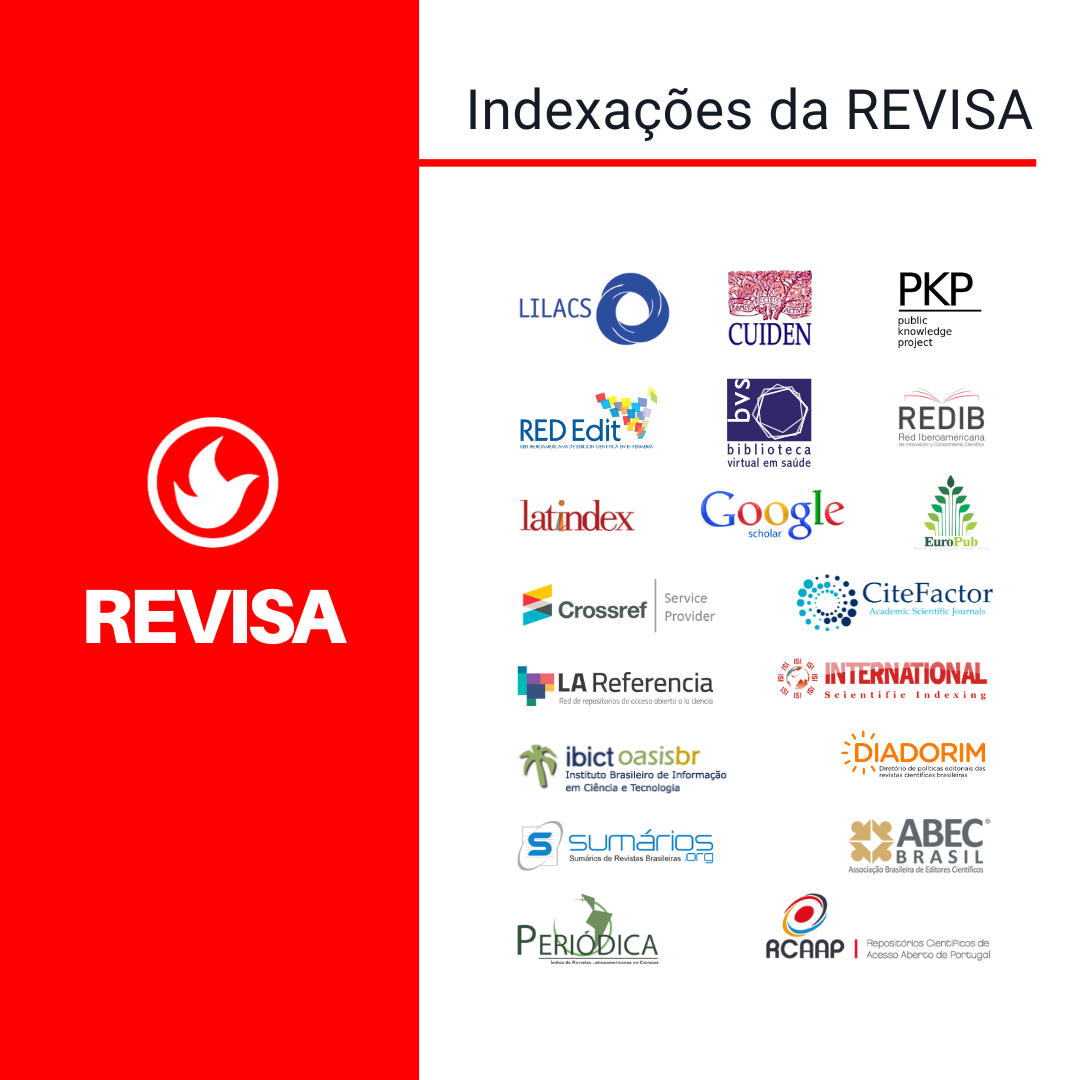The Influence of Anxiety During the Pandemic on the Dietary Behavior of Nutrition and Business Administration Students
Keywords:
Eating Behavior, Anxiety, PandemicAbstract
Objective: to assess the influence of anxiety on eating behavior during the pandemic in students of Nutrition and Business Administration courses at a university in Southern Santa Catarina. Method: A total of 96 enrolled students from the 4th to the 8th semester, aged 18 to 59, of both sexes, participated in the research. Data were collected through a questionnaire containing questions about diet, eating behavior, and anxiety symptoms. Results: Overall, 41.6% (n=40) of students were from the Business Administration course, and 58.3% (n=56) from Nutrition. The majority reported consuming sugary and fatty foods during moments of anxiety. There were changes in dietary patterns, with a focus on ultra-processed foods, fast food, and alcoholic beverages, reflecting on body weight. Conclusion: The study revealed an increase in signs and symptoms of anxiety during the pandemic, impacting the eating behavior of university students.
References
OMS. Organização Mundial da Saúde. COVID – 19. 2020. Disponível em:< https://www.who.int/pt >. Acesso em: 15 set. 2021.
BRASIL. Ministério da Saúde. O que é o COVID-19. 2021. Disponível em:< https://www.gov.br/saude/pt-br/coronavirus/o-que-e-o-coronavirus >. Acesso em: 20 set. 2021.
ARAUJO, V.M.M; BAHOUTH, V.S.M. Influência da Ansiedade e Estresse no Comportamento Alimentar de Universitários em Tempos de Pandemia. Centro Universitário de Brasília – CEUB faculdade de ciências da educação e saúde Curso de nutrição. Brasília, 2021, 23 p.
FIOCRUZ. Fundação Oswaldo Cruz. Saúde Mental e Atenção Psicossocial na Pandemia COVID-19. A quarentena do COVID-19: Orientações e Estratégias de Cuidado. Ministério da Saúde. 2020, 15 p.
FONAPRACE. Fórum Nacional de Pró-Reitores de Assuntos Comunitários e Estudantis. Brasília, 2018, 318p.
VAZ, D. S. S., & BENNEMANN, R. M. Comportamento alimentar e Hábito alimentar: uma revisão. Revista UNINGÁ Review. 2014. 20(1), 112 p.
CLARO, R. M. et al. ... Patrícia Constante et al. Perfil nutricional da dieta no Brasil. ev Saúde Pública 2015;49:38.
RODRÍGUEZ-MARTÍN, B. C.; MEULE, A. Food craving: new contributions on its assessment, moderators, and consequences. Front Psychol. 2015, v. 6, p. 21.
MA, Y; ZHAO, W; LIU, J; HE, X; W, B; FU, S; YAN, W; NIU, J; ZHOU, J; LUO, B. Effects of temperature variation and humidity on the death of COVID-19 in Wuhan, China. Rev. Science of The Total Environment. 2017, 7 p.
MUSCOGIURI, G. et al. Nutritional recommendations for CoVID-19 quarantine. European Journal of Clinical Nutrition, [S.l.], 2020.
YOLMAZ, C. & GÖKMEN, V. Neuroactive compounds in foods: occurrence, mechanism and potential health effects. Food Res. 2020, v. 128.
WU, C. et al. Risk factors associated with acute respiratory distress syndrome and death in patients with coronavirus disease. Pneumonia in Wuhan, China. JAMA Intern Med. 2020.
QUALIBEST. Galunion. Alimentação na Pandemia como a COVID-19 impacta os consumidores e os negócios em alimentação. 2020, 52 p.
CARVALHO. L. O aumento do consumo de álcool em tempos de pandemia. 2020, 50 f.
BARROS, M.S.M.R; COSTA, S.M. Perfil do consumo de álcool entre estudantes universitários. SMAD, Rev. Eletrônica Saúde Mental Álcool Drog. 2019 Jan.-Mar.;15(1):4-13.
RENOVATO, H.P.C; LARAICH, O.A. Perfil socioeconômico dos estudantes de administração oriundos da rede pública de ensino. 2021, 23 p.
IBOPE. Pesquisa de opinião pública sobre vegetarianismo. 2018. Disponível em: https://www.svb.org.br/images/Documentos/JOB_0416_VEGETARIANISMO.pdf Acesso em: 16 mai. 2022.
SCARPONI, A.P; SANTOS, N.Q; OLIVEIRA, D.V; BERTOLINI, S. Alterações comportamentais em saúde, ansiedade e sintomas depressivos em pessoas sob isolamento social na pandemia da COVID-19. Anais Eletrônico XII EPCC UNICESUMAR - Universidade Cesumar. 2021.
UNIMAM. Site. 2020. Disponível em: https://unimam.com.br/institucional/a-unimam/ . Acesso em: 10 abr.2022.
MAYNARD, D.C; ANJOS, H.A; MAGALHÃES, A.C.V; GRIMES, L.N; COSTA, M.G.O; SANTOS, R.B. Food consumption and anxiety among the adult population during the COVID-19 pandemic in Brazil. Health Sciences. 2021, vol. 9 no. 11.
PECHINIM, I; BARBOSA, G.A.S; WERNECK, A.L. Ansiedade e depressão no contexto da pandemia COVID- 19 e a relação com os mecanismos de defesa das gestantes. Research, Society and Development. 2021, v. 10, n. 10.
BORGES, R.F. Mudança de Hábitos Alimentares Durante a Pandemia de COVID-19. Trabalho de Conclusão de Curso. Universidade Federal de Goiás. Goiânia. 2020, 33 p.
BICALHO, E.; VIEIRA, B. B. T. Avaliação do consumo alimentar durante o COVID-19. Jornal de Investigação Médica, v. 1, 2021.
IBOPE. Pesquisa de opinião pública sobre vegetarianismo. 2018. Disponível em: https://www.svb.org.br Acesso em: 16 mai. 2022.
ROCHA, S; FONSECA, T; FREITAS, L; ROCHA, L.M; MACEDO, M.T.S; OLIVEIRA, S; FRANÇA, D.S; CALDEIRA, L; POPOFF, L. Fatores associados ao aumento do consumo de alimentos ultraprocessados em universitários durante o isolamento social - pandemia covid-19. Revista Brasileira de Obesidade, Nutrição e Emagrecimento. 2020.
SARTOR, M.T.Q. Um Estudo da relação entre a ansiedade e o estado nutricional dos militares de um pelotão de bombeiros localizado no sul Catarinense. Universidade do Extremo Sul Catarinense – UNESC. Curso de Nutrição. Criciúma, 2020, 120 p.
VERTICCHIO, D.F.R; VERTICCHIO, N.M. The impacts of social isolation about changes of eating behavior and weight gain during the COVID-19 pandemic in Belo Horizonte and metropolitan region, State of Minas Gerais, Brazil. 2020.
Downloads
Published
How to Cite
Issue
Section
License
Copyright (c) 2024 Revista de Divulgação Científica Sena Aires

This work is licensed under a Creative Commons Attribution 4.0 International License.
-
Atribuição — Você deve dar o crédito apropriado, prover um link para a licença e indicar se mudanças foram feitas. Você deve fazê-lo em qualquer circunstância razoável, mas de nenhuma maneira que sugira que o licenciante apoia você ou o seu uso.
- Sem restrições adicionais — Você não pode aplicar termos jurídicos ou medidas de caráter tecnológico que restrinjam legalmente outros de fazerem algo que a licença permita.





